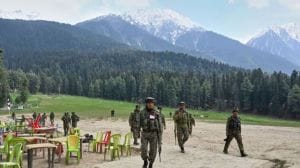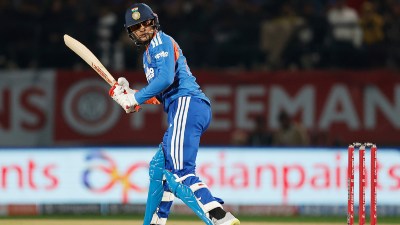Stay updated with the latest - Click here to follow us on Instagram
Protests on, 10% Agniveer quota for jobs in paramilitary, Defence ministry
Rajnath meets chiefs of three Services; for 1st batch, age relaxation in CAPFs, Assam Rifles for 5 yrs after upper limit
 Protestors block railway tracks during a protest against "Agnipath scheme" for recruiting personnel for armed forces (Representational/Reuters)
Protestors block railway tracks during a protest against "Agnipath scheme" for recruiting personnel for armed forces (Representational/Reuters)Moving to dial down anger on the streets over the short-term Agnipath recruitment for the armed forces, the government Saturday announced that 10 per cent of vacancies in the Central Armed Police Forces and Assam Rifles will be reserved for Agniveers exiting the three services after a four-year stint.
It also announced 10 per cent reservation for Agniveers in jobs in the Ministry of Defence and Defence Public Sector Undertakings.
These measures came on the day protests against the Agnipath scheme continued in Bihar, UP, Haryana, Jammu and also spread to Punjab and Kerala. In Rajasthan, the Council of Ministers, at a meeting chaired by Chief Minister Ashok Gehlot, passed a resolution urging the Centre to withdraw the scheme “keeping in mind the larger public interest and sentiments of the youth”.
In New Delhi, Defence Minister Rajnath Singh held a meeting with Army chief General Manoj Pande, Navy chief Admiral R Hari Kumar and IAF chief Air Chief Marshal VR Chaudhari.
🚨 Limited Time Offer | Express Premium with ad-lite for just Rs 2/ day 👉🏽 Click here to subscribe 🚨
In a Twitter post, the office of Union Home Minister Amit Shah said, “The Ministry of Home Affairs (MHA) decides to reserve 10% vacancies for recruitment in CAPFs and Assam Rifles for Agniveers. The MHA also decides to give 3 years age relaxation beyond the prescribed upper age limit to Agniveers for recruitment in CAPFs & Assam Rifles. Further, for the first batch of Agniveer, the age relaxation will be for 5 years beyond the prescribed upper age limit.”
The Ministry of Defence had earlier granted a one-time age relaxation of two years for this year’s Agniveer batch, raising the upper age limit for candidates from 21 to 23 years.
Sources said the 10 per cent reservation for Agniveers in vacancies will be in addition to the 10 per cent quota for ex-servicemen that already exists in CAPFs. Currently, soldiers, sailors and airmen can join the CAPFs under the quota after completion of their service.
The quota is part of efforts to assure aspirants of the Agnipath scheme that their future will not be uncertain since most will only have a four-year stint in the armed forces.
The Ministry of Defence said Rajnath Singh has “approved a proposal to reserve 10% of the job vacancies in Ministry of Defence for Agniveers meeting requisite eligibility criteria. The 10% reservation will be implemented in the Indian Coast Guard, defence civilian posts and all the 16 Defence Public Sector Undertakings — Hindustan Aeronautics Limited (HAL), Bharat Electronics Limited (BEL), Bharat Earth Movers Limited (BEML), Bharat Dynamics Limited (BDL), Garden Reach Shipbuilders & Engineers (GRSE) Limited, Goa Shipyard Limited (GSL), Hindustan Shipyard Limited (HSL), Mazagon Dock Shipbuilders (MDL), Mishra Dhatu Nigam (Midhani) Limited, Armoured Vehicles Nigam Limited (AVNL), Advanced Weapons & Equipment India Ltd. (AW&EIL), Munitions India Limited (MIL), Yantra India Limited (YIL), Gliders India Limited (GIL), India Optel Limited (IOL) and Troop Comforts Limited (TCL).”
“This reservation would be in addition to existing reservations for ex-servicemen. Necessary amendments to relevant recruitment rules will be undertaken to implement these provisions. The DPSUs will be advised to make similar amendments to their respective recruitment rules. Necessary age relaxation provision will also be made to enable recruitment of Agniveers to the above posts,” the Ministry said.
These measures have been taken after protests in several parts of the country against the Agnipath short-term scheme. Aspirants are angry since the new recruitment policy stipulates only a four-year service for soldiers, sailors and airmen, and will not provide them lifelong pension or healthcare benefits.
Under the new policy, 46,000 Agniveers will be recruited for the three services this year, and between 50,000 to 60,000 annually thereafter. The Agniveers will leave their respective services after a four-year period. Of them, 25 per cent will be recruited again for a 15-year period, and they will receive pension and lifelong healthcare benefits.
This temporary nature of the job for 75 per cent of the recruits has riled aspirants. There was no recruitment for the armed forces in the last two years and the government attributed this to the Covid-19 pandemic. The wait pushed many aspirants beyond the upper age limit of 21 years – the reason why the government announced a one-time waiver, increasing the eligible age to 23 this year.







